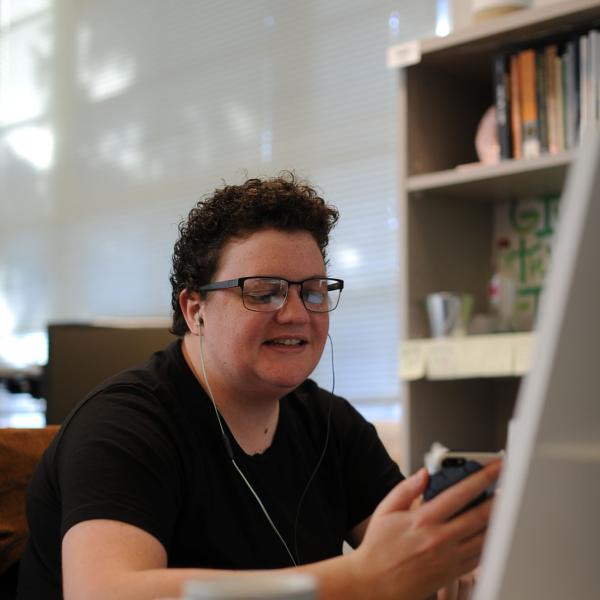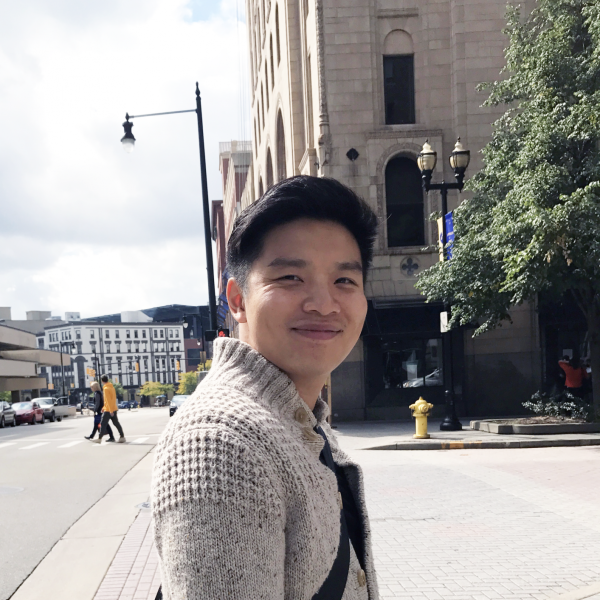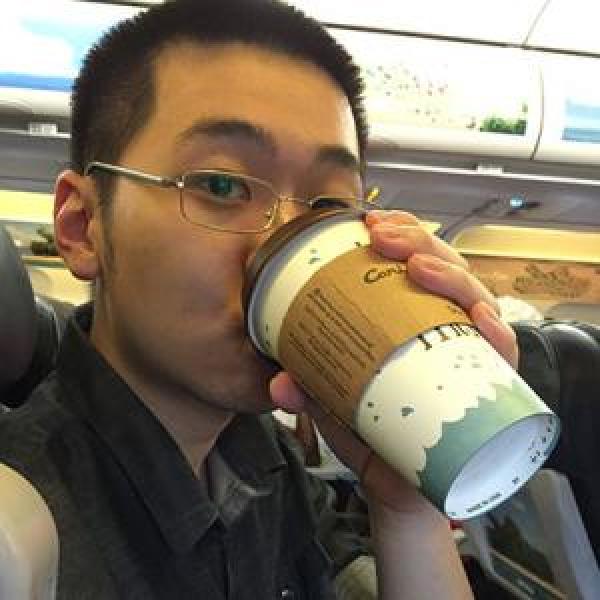Ph.D. in Information Science
Diverse Students
Information Science is a broad discipline, and our students come from a range of backgrounds. Some have computer science degrees, and come prepared to take on information science with a toolkit of computational and data science methods. Some have little to no experience in computing, but have backgrounds in social science or qualitative research. Some come to us with a rich knowledge of domains (e.g., public health, education, or journalism) to which information science research and techniques can be applied. Some come straight out of undergraduate programs, others have already completed graduate degrees, and others have years of professional experience.
Our program is designed to help Ph.D. students tailor their education towards their own research interests and skill sets while developing a shared body of knowledge around methods, computational techniques, theoretical frameworks, and design practices.
Student Voices: Why CU?
"My experience at CU Boulder's information science department has been one of a kind. Not only are the faculty knowledgeable and supportive, they work hard to help the graduate students have a strong professional network. My experience at CU is truly incredible."
“Our department has a very inclusive culture. I’m always encouraged to bring my unique perspective and experiences to our community. And my colleagues all have diverse backgrounds, which is really helpful as I am exploring research areas.”
"I love the community. The grad students have a range of backgrounds from Computer Science to Anthropology to English. Everyone can offer a unique perspective while being really supportive of your interests."
Research a mile above ordinary.
You can find out more about the research interests of both our faculty and current PhD students on their profile pages. Examples of research groups led by our faculty include the VisuaLab, the Too Much Information (TMI) Lab, the Philanthropic Informatics Lab, the Creative Communities Group, That Recommender Systems Lab, and the Internet Rules Lab (IRL).
High Impact Publications
Within the first few years of our PhD program, our students have published and presented work in venues such as CHI (human-computer interaction), VIS (information visualization), AAAI (artificial intelligence), CSCW (collaboration & social computing), NAACL (computational linguistics), Ubicomp (ubiquitous computing), AOIR (internet research), and SIGCSE (computer science education).
Recent Student Publications
- Brianna Dym and Casey Fiesler. "Ethical and Privacy Considerations for Research Using Online Fandom Data." Transformative Works and Cultures, 2020.
- Mikhaila Friske, Shanel Wu, and Laura Devendorf. “Entangling the Roles of Maker and Interpreter in Interpersonal Data Narratives: Explorations in Yarn and Sound.” Proceedings of the ACM SIGCHI Conference on Designing Interactive Systems (IDC), 2020.
- Natalie Garrett, Nathan Beard, and Casey Fiesler. "More Than 'If Time Allows': The Role of Ethics in AI Education." Proceedings of the ACM Conference on AI, Ethics and Society (AIES), 2020.
- Anthony T Pinter, Jacob M Paul, Jessie Smith, and Jed R Brubaker. "P4KxSpotify: A Dataset of Pitchfork Music Reviews and Spotify Musical Features." Proceedings of the AAAI International Conference on Web and Social Media (ICWSM).
- Morgan Klaus Scheuerman, Jacob M. Paul, and Jed R. Brubaker. "How We’ve Taught Algorithms to See Identity: Constructing Race and Gender in Image Databases for Facial Analysis." Proc. ACM Human-Computer Interaction, CSCW, 2020.
- Nasim Sonboli, Farzad Eskandanian, Robin Burke, Weiwen Liu, and Bamshad Mobasher. "Opportunistic Multi-aspect Fairness through Personalized Re-ranking." Proceedings of the ACM Conference on User Modeling, Adaptation and Personalization (UMAP), 2020.
- Jordan Wirfs-Brock and Katie Quehl. "Giving Voice to Silent Data: Designing with Personal Music Listening History." Proceedings of the ACM Conference on Human Factors in Computing Systems (CHI), 2020.
- Junnan Yu and Ricarose Roque. “Considering Parents in Coding Kit Design: Understanding Parents' Perspectives and Roles.” Proceedings of the ACM Conference on Human Factors in Computing Systems (CHI), 2020.
Funded Research Projects
Across our department, there are many research projects happening at any given point, covering a wide range of domains and methods. Examples of funded projects in our department include research involving building computational tools to help scale qualitative data analysis, computer-mediated communication during crisis, organizational behavior in e-sports teams, research ethics for social computing, real-world machine learning, fairness-aware recommender systems, and humanizing algorithms.
Targeted RecruitmentMembers of our faculty sometimes seek PhD prospective students with an interest in specific funded projects. Though applicants with any research interest are encouraged, here are some targeted recruitment calls:
Dr. Laura Devendorf is seeking a PhD student who is interested in studying design collaboration and/or building design software tools in close collaboration with artists and engineers to join the Unstable Design Lab. This PhD project is funded by a National Science Foundation CAREER grant entitled "Developing Next-Generation Rapid Prototyping Tools to Catalyze Innovation in Smart Textiles." Much of the work in the Unstable Design Lab explores smart textiles as a context within which to explore equity in innovation, particularly between people who identify as craftspeople or technologists. Students in the lab are artists and technologies and produce open-source software tools as well as publications and artworks that take a critical perspective on design and design futures. For more information, please see our lab website at http://unstable.design.
Dr. Stephen Voida is seeking PhD students who interested in exploring the design of technologies for supporting individuals are managing stress, burnout, and serious mental illnesses such as bipolar disorder. The Too Much Information research lab is developing partnerships in support of these research efforts with the CU Boulder Institute of Cognitive Science, the CU Department of Psychology and Neuroscience, and the BRITE Center at the University of Washington. We are particularly interested in recruiting students with an interest in human-centered software engineering research in support of these initiatives. For more information, please see our lab website at https://tmilab.colorado.edu.
-->
Core Research Areas
Collaboration
Information Visualization
Data Science & Analytics
Ethics & Policy
Design and Human-Computer Interaction
Learning
Social Computing
CU Research in the News
Student Voices: Industry Research Internships
"During my internship with Yahoo, I got intense hands-on experience with many research methods that I wouldn't have necessarily had the chance to use during the academic year. Experiencing research at the pace of industry expanded my understanding of how to scope my own projects."
"Interning with Google's Ethical AI team I experienced what academic research looks like in an industry environment. I got to dig deep on issues of ethics and transparency in machine learning, and collaborate with some of the most admired researchers in the field."
"My research internship at Facebook really let me see what it’s like to do industry research and work on projects that can impact billions of people and has led to ongoing collaborations. My understanding of industry research from the internship will also help me with industry job interviews."
A new approach to Information Science
Our department was founded in 2015 as part of the new College of Media, Communication, and Information (CMCI) at CU Boulder. We worked hard to develop a new, forward-looking vision of what information science is, and we are a collaborative and interdisciplinary department with close ties to others on campus--notably, Computer Science, the ATLAS Institute, the Institute of Behavioral Science, and other departments within CMCI such as Media Studies and Communication. Because we are so new, our students have had a strong voice in forming the culture and direction of our department, and will continue to do so!
What are you waiting for?
For general questions about the PhD program, please contact Professor Casey Fiesler at casey.fiesler@colorado.edu. We also encourage prospective students to reach out to specific faculty members whose research interests most closely match their own.
Our application deadline for PhD applicants for next year is December 1st.







